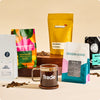Whether you're a longtime customer, or new to Trade, you know that we're all about finding something you love. Lucky for you, that pursuit doesn't just stop at coffee!
We partnered with our friends at Bright Cellars — who share in our commitment to finding your perfect match — to bring you the ultimate Coffee Lover's Guide to Wine, with notes from our Director of Coffee and Q Grader, Maciej Kasperowicz, and Bright Cellars' Certified Sommelier, Courntey Hill. Whether you love a burundi coffee or a more citrus coffee, there is a pairing for all. Coffee and wine lovers unite, cheers!

If you like: Ethiopian coffee
Ethiopia is the birthplace of coffee, and most of the washed-process beans we get from there, grown from heirloom coffee varieties at high elevations, have intense floral aromas and flavors of stone fruits and citrus, with gentle, tea-like bodies for all you tea lovers out there as well.
Example: Broadsheet Geta Bore
Try: Riesling
Rieslings can be made in dry or sweet styles are always powerfully aromatic with prominent notes of flowers, stone fruits, and bright citrus like lime. These wines are generally lighter in body with refreshing acidity.
Suggested pairing: Gladiolus Riesling 2020

If you like: Natural process coffee
Natural processing often imparts the flavor of berries and other ripe (sometimes bordering on overripe) or preserved fruit, with sweetness we describe as jammy or syrupy. Blueberries are the most famous note, especially in Ethiopian naturals, but you might also taste pineapple or strawberries, with chocolate flavors occasionally appearing in the background.
Example: Methodical Ethiopia Dur Feres
Try: Zinfandel
Zinfandels are the perfect pairing here, as they are the epitome of ‘jammy’ wines with lots of berry notes and an overripe, stewed, or preserved fruit character. These wines are generally dry, but the fruit-forward character is often perceived as higher levels of sweetness.
Suggested pairing: Obscura Zinfandel 2016

If you like: Brazilian coffee
What is Brazilian coffee? Brazilian coffees are big-bodied and syrupy, but unlike the natural process coffees grown in Africa at higher elevations, they’re often not very fruity. The always delicious flavor combo of chocolate and nut butter often makes an appearance with other candy bar flavors like caramel. Occasionally subtle fruit notes like cherry or orange zest appear in the background.
Example: Red Bay Brazilian Cake Lady
Try: Merlot
Merlot is a medium to full-bodied varietal red wine, depending on where it’s grown, and is the most common varietal associated with mocha, chocolate, or cocoa flavors.
Suggested pairing: Lost City Merlot 2020

If you like: Sumatran coffee
Because of its land, its coffee varieties, and especially its distinct processing methods, the Indonesian island of Sumatra produces very unique coffees. But, what is Sumatra coffee and what characterizes it? Many of them are dominated by earthy notes, with flavors of chocolate, clove, and dark caramel also plentiful.
Example: Caffe Vita Sumatra Gayo River
Try: Pinot Noir
Pinot noir is the most common varietal with earthy qualities, usually presenting as aromas of mushroom, truffle, potting soil, or barnyard.
Suggested pairing: Tetrachroma Pinot Noir 2020

If you like: Kenyan coffee
Coffees from Kenya are prized for their uniquely high acidity (think lime), which is often balanced by a resinous sweetness that reminds us of blackcurrant and sometimes a savory tomato note.
Example: Portrait Chania Bridge AA
Try: Sauvignon Blanc
Easily recognizable to a wine drinker by its signature ‘green’ flavors due to the presence of pyrazines, Sauvignon Blanc typically shows savory vegetal notes like bell pepper, tomato leaf, or fresh herbs. It also has high levels of acidity and prominent citrus flavors.
Suggested pairing: Kalypto Sauvignon Blanc 2020

If you like: Dark roasts
No matter its origin, variety, or processing method, if you roast coffee dark enough, you’ll get some smoky flavors. Dark roasts are usually pretty big-bodied, and those burnt fibers can also lead to a little extra bitterness. In addition to smoke, you might get flavors of dark chocolate, raw sugar, or burnt caramel.
Example: Joe Big City
Try: Syrah
Bold and full-bodied, Syrah is also very dark & concentrated in color. A wine enthusiast will say it almost always shows some level of smokiness, perceived as either campfire smoke or smoked meat. It’s generally high in astringency with noticeable bitterness.
Suggested pairing: Nihilist Wine Co. Syrah 2020

If you like: Central American coffee
There’s a wide variety of flavors in the coffees of Central America, but they’re often some of the most balanced coffees out there, featuring lots of sugar-browning/caramelization flavors like roasted almond or milk chocolate, but also gentle citrus and red fruit, often with medium acidity and medium body.
Example: Alma Soulmate
Try: Rosé
Rosé wines generally sit at the intersection between white and red wines in terms of flavor profile, with citrus and red fruit flavors being the most common fruit notes.
Suggested pairing: Life in the Woods Rosé 2019

If you like: House blends
There are many different kinds of coffee blends with different components, including some as tasty and/or wild as any single-origin coffees. Still, there’s definitely a sort of middle-of-the-road, easy-drinking coffee-that-tastes-like-coffee kind of blend that tastes identifiably high-quality but also not too out there.
Example: Greater Goods Kickstart
Try: Red blends
Here I’d suggest a red blend! Again, these vary widely in style, depending on what wine region they’re grown in and what grapes are used to make them, but they often fall in an easy-drinking, middle-of-the-road profile making it the perfect gift for a wine lover.
Suggested pairing: Folk & Fable Red Blend 2019
More of a beer drinker? Beer with coffee sounds a bit odd but the similarities between the two may just make them long lost siblings!









